
Sentient
Your personal, private & interactive AI companion
Stars: 52

Sentient is a personal, private, and interactive AI companion developed by Existence. The project aims to build a completely private AI companion that is deeply personalized and context-aware of the user. It utilizes automation and privacy to create a true companion for humans. The tool is designed to remember information about the user and use it to respond to queries and perform various actions. Sentient features a local and private environment, MBTI personality test, integrations with LinkedIn, Reddit, and more, self-managed graph memory, web search capabilities, multi-chat functionality, and auto-updates for the app. The project is built using technologies like ElectronJS, Next.js, TailwindCSS, FastAPI, Neo4j, and various APIs.
README:
- About The Project
- Roadmap
- Getting Started
- Usage
- Contributing
- FAQ
- License
- Contact
- Acknowledgements
- Official Team
We at Existence believe that AI won't simply die as a fad or remain limited to an assistant. Instead, it will evolve to be a true companion of humans and our aim with Sentient is to contribute to that future. Building a true companion requires excellent automation which in turn requires deep personalization. And if we want the AI to be completely context aware of the user, privacy is non-negotiable. Hence, our goal is to build a completely private, personal & interactive AI companion. And we want to build it in the open, not behind closed doors
Sentient Desktop App
- Completely Local and Private
- MBTI Personality Test
- LinkedIn, Reddit and X Integration for Personal Context
- Self-Managed Graph Memory - Sentient can learn about the user from their interactions with it. Memories are saved in a knowledge-graph.
- Agentic integrations for GSuite - Gmail, GCalendar, GDrive, GDocs, GSheets, GSlides support.
- Web Search capabilities - Sentient can search the web for additional context to answer queries
- Multi-chat functionality
- Auto-updates for the app
- [x] Solving stability issues with model inference - improving structured outputs, better error handling, and more
- [ ] Dual Memory - Sentient will have a short-term memory and a long-term memory. The short-term memory will be stored in a relational DB and used to maintain reminders and other short-term information. Longer-term facts about the user will persist in the knowledge graph.
- [ ] Intent - Sentient will be able to perform actions autonomously based on triggers from the short-term memory.
- [ ] Tool-specific UI - for example, a tool that retrieves stock prices will also show a graph of the past trend of that particular ticker.
- [ ] Better Internet Search - Internet search will include images, citations, direct links to sources and more.
- [ ] More tools! - More tools will be added in the order of user requests. Current requests - Notion, LinkedIn, GitHub and WhatsApp.
- [ ] Advanced Voice Mode - Users will be able to talk to Sentient!
- [ ] Browser Use - Sentient will be able to control the browser and interact with websites to perform tasks
- [ ] Full integration at the OS level - integrate context from what you are doing right now by sharing your screen with Sentient
- [ ] Customizable Agentic Actions - users can create their own integrations using an easy-to-use interface. Users should also be able to trade custom Actions on a Marketplace.
If you're not interested in contributing to the project and simply want to use Sentient, download the latest release from our website.. All dependencies are packaged into our installer - you do not need to download anything else. You can find installation instructions in our docs.
The following instructions are for Linux based machines, but they remain fundamentally same for Windows & Mac
Clone the project
git clone https://github.com/existence-master/Sentient.gitGo to the project directory
cd SentientInstall the following to start contributing to Sentient:
-
npm: The ElectronJS frontend of the Sentient desktop app uses npm as its package manager.
Install the latest version of NodeJS and npm from here.
After that, install all the required packages.
cd ./src/interface && npm install
-
python: Python will be needed to run the backend. Install Python from here. We recommend Python 3.11.
After that, you will need to create a virtual environment and install all required packages. This venv will need to be activated whenever you want to run any scripts on the Python backend.
cd src/model && python3 -m venv venv cd venv/bin && source activate cd ../../ && pip install -r requirements.txt
-
Ollama: Download and install the latest version of Ollama from here.
After that, pull the model from Ollama.
ollama pull llama3.2:3b
-
Neo4j Community: Download Neo4j Community Edition from here.
Next, you will need to enable the APOC plugin. After extracting Neo4j Community Edition, navigate to the labs folder. Copy the
apoc-x.x.x-core.jarscript to the plugins folder in the Neo4j folder. Edit the neo4j.conf file to allow the use of APOC procedures:sudo nano /etc/neo4j/neo4j.conf
Uncomment or add the following lines:
dbms.security.procedures.unrestricted=apoc.* dbms.security.procedures.allowlist=apoc.* dbms.unmanaged_extension_classes=apoc.export=/apoc
You can run Neo4j community using the following commands
cd neo4j/bin && ./neo4j console
While Neo4j is running, you can visit
http://localhost:7474/to run Cypher Queries and interact with your knowledge graph.⚠️ On your first run of Neo4j Community, you will need to set a username and password. Remember this password as you will need to add it to the.envfile on the Python backend.
You will need the following environment variables to run the project locally. For sensitive keys like Auth0, GCP, Brave Search you can create your own accounts and populate your own keys or comment in the discussion titled 'Request Environment Variables (.env) Here' if you want pre-setup keys
For the Electron Frontend, you will need to create a .env file in the src/interface folder. Populate that .env file with the following variables (examples given).
ELECTRON_APP_URL= "http://localhost:3000"
APP_SERVER_URL= "http://127.0.0.1:5000"
APP_SERVER_LOADED= "false"
APP_SERVER_INITIATED= "false"
NEO4J_SERVER_URL= "http://localhost:7474"
NEO4J_SERVER_STARTED= "false"
BASE_MODEL_REPO_ID= "llama3.2:3b"
AUTH0_DOMAIN = "abcdxyz.us.auth0.com"
AUTH0_CLIENT_ID = "abcd1234"
For the Python Backend, you will need to create a .env file and place it in the src/model folder. Populate that .env file with the following variables (examples given).
NEO4J_URI=bolt://localhost:7687
NEO4J_USERNAME=neo4j
NEO4J_PASSWORD=abcd1234
EMBEDDING_MODEL_REPO_ID=sentence-transformers/all-MiniLM-L6-v2
BASE_MODEL_URL=http://localhost:11434/api/chat
BASE_MODEL_REPO_ID=llama3.2:3b
[email protected]
LINKEDIN_PASSWORD=password123
BRAVE_SUBSCRIPTION_TOKEN=YOUR_TOKEN_HERE
BRAVE_BASE_URL=https://api.search.brave.com/res/v1/web/search
GOOGLE_CLIENT_ID=YOUR_GOOGLE_CLIENT_ID_HERE
GOOGLE_PROJECT_ID=YOUR_PROJECT_ID
GOOGLE_AUTH_URI=https://accounts.google.com/o/oauth2/auth
GOOGLE_TOKEN_URI=https://oauth2.googleapis.com/token
GOOGLE_AUTH_PROVIDER_CERT_URL=https://www.googleapis.com/oauth2/v1/certs
GOOGLE_CLIENT_SECRET=YOUR_SECRET_HERE
GOOGLE_REDIRECT_URIS=http://localhost
AES_SECRET_KEY=YOUR_SECRET_KEY_HERE
AES_IV=YOUR_IV_HERE
AUTH0_DOMAIN=abcdxyz.us.auth0.com
AUTH0_MANAGEMENT_CLIENT_ID=YOUR_MANAGEMENT_CLIENT_ID
AUTH0_MANAGEMENT_CLIENT_SECRET=YOUR_MANAGEMENT_CLIENT_SECRET
APP_SERVER_PORT=5000
AGENTS_SERVER_PORT=5001
MEMORY_SERVER_PORT=5002
CHAT_SERVER_PORT=5003
SCRAPER_SERVER_PORT=5004
UTILS_SERVER_PORT=5005
COMMON_SERVER_PORT=5006
AUTH_SERVER_PORT=5007
Install dependencies
Ensure that you have installed all the dependencies as outlined in the Prerequisites Section.
Start Neo4j
Start Neo4j Community Edition first.
cd neo4j/bin && ./neo4j consoleStart the Python servers
Example: Agents Server
cd src/model/venv/bin/ && source activate
cd ../../agents && sudo ./startserv.shstartserv.sh script with the absolute paths to your scripts and your venv.
Start the Electron App
cd src/interface && npm run dev❗ You are free to package and bundle your own versions of the app that may or may not contain any modifications. However, if you do make any modifications, you must comply with the AGPL license and open-source your version as well.
Sentient is a personal companion that remembers information about you and uses this personal context to respond to queries and perform actions for you.
Sentient can already do a lot.
"Hey Sentient, help me find a restaurant in Pune based on my food preferences.What are the upcoming events in my Google Calendar?Setup a lunch meeting with [email protected] and add it to my CalendarCreate a pitch deck for my startup in Google Slides and email it to [email protected]Help me find new hobbies in my city
Contributions are always welcome!
See the contributing guide for ways to get started.
Please read the code of conduct
-
Do you need internet to run the app?
- No. Since the app is fully local, you do not need internet to use the core features. You only need Internet to launch the app since Auth0 needs to authenticate you with your token. Of course, you will also need internet to perform most actions like adding events to your calendar, sending emails, etc.
-
Why is authentication needed?
- We only ask for authentication so that we as developers can know who our users are. This can help us stay in touch with early users for development purposes.
-
What data do you collect about me?
- For auth, we have a standard email-password flow provided by Auth0 (also supports Google OAuth). So, the only data we collect is the email provided by users and their login history. This helps us understand how users are using the app, retention rates, daily signups and more. Read more about data collection in our privacy policy.
-
What kind of hardware do I need to run the app?
- To run Sentient - any decent CPU (Intel Core i5 or equivalent and above), 8GB of RAM and a GPU with 4-6GB of VRAM should be enough. A GPU is required for smooth local model inference. The app only runs on Windows for now. If you run the app from source/build your own versions with a different model, these system requirements will change.
-
Why open source?
- Since the app is going to be processing a lot of your personal information, maintaining transparency of the underlying code and processes is very important. The code needs to be available for everyone to freely view how their data is being managed in the app. We also want developers to be able to contribute to Sentient - they should be able to add missing integrations or features that they feel should be a part of Sentient. They should also be able to freely make their own forks of Sentient for different use-cases, provided they abide by the GNU AGPL license and open-source their work.
-
Why AGPL?
- We intentionally decided to go with a more restrictive license, specifically AGPL, rather than a permissive license (like MIT or Apache) since we do not want any closed-source, cloud-based competitors cropping up with our code at its core. Going with AGPL is our way of staying committed to our core principles of transparency and privacy while ensuring that others who use our code also follow the same principles.
Distributed under the GNU AGPL License. Check our lisence for more information.
Sentient wouldn't have been possible without
The official team behind Sentient
|
itsskofficial |
kabeer2004 |
abhijeetsuryawanshi12 |
For Tasks:
Click tags to check more tools for each tasksFor Jobs:
Alternative AI tools for Sentient
Similar Open Source Tools

Sentient
Sentient is a personal, private, and interactive AI companion developed by Existence. The project aims to build a completely private AI companion that is deeply personalized and context-aware of the user. It utilizes automation and privacy to create a true companion for humans. The tool is designed to remember information about the user and use it to respond to queries and perform various actions. Sentient features a local and private environment, MBTI personality test, integrations with LinkedIn, Reddit, and more, self-managed graph memory, web search capabilities, multi-chat functionality, and auto-updates for the app. The project is built using technologies like ElectronJS, Next.js, TailwindCSS, FastAPI, Neo4j, and various APIs.
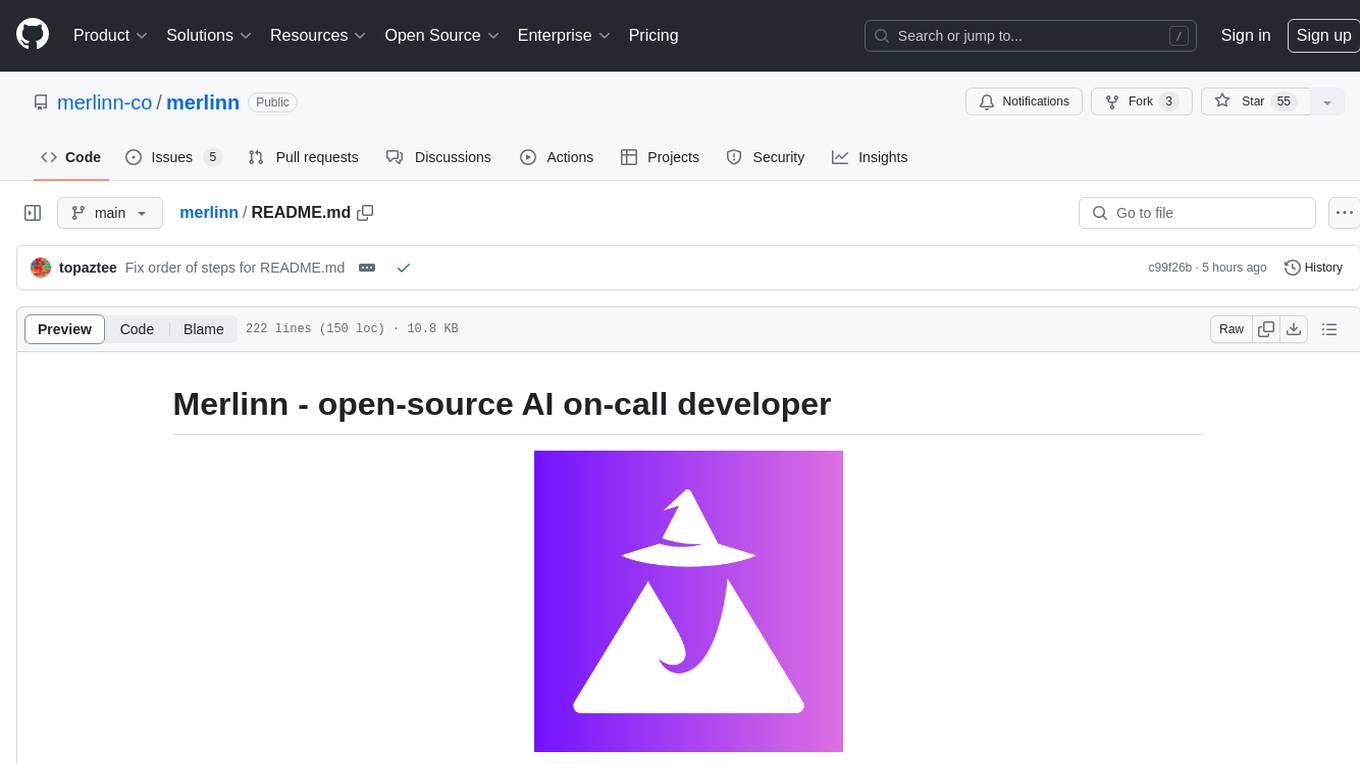
merlinn
Merlinn is an open-source AI-powered on-call engineer that automatically jumps into incidents & alerts, providing useful insights and RCA in real time. It integrates with popular observability tools, lives inside Slack, offers an intuitive UX, and prioritizes security. Users can self-host Merlinn, use it for free, and benefit from automatic RCA, Slack integration, integrations with various tools, intuitive UX, and security features.
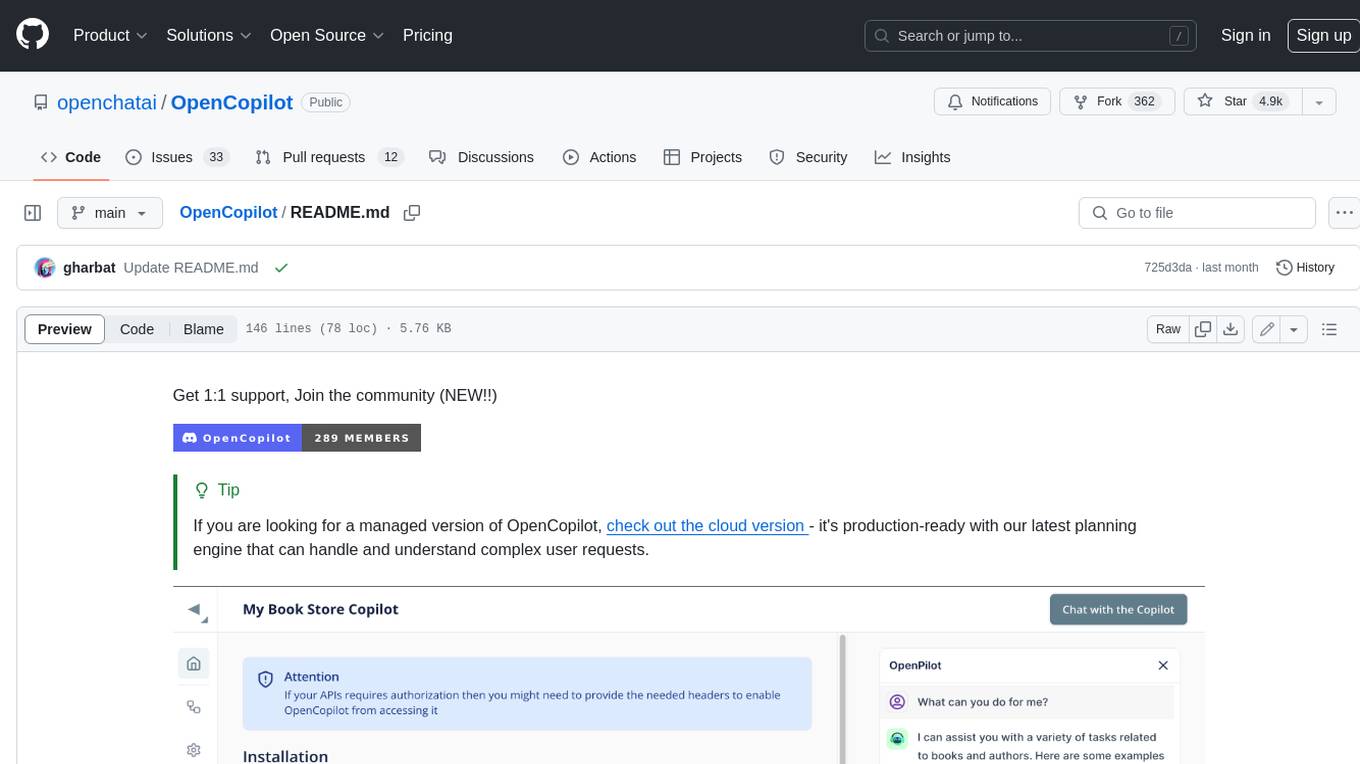
OpenCopilot
OpenCopilot allows you to have your own product's AI copilot. It integrates with your underlying APIs and can execute API calls whenever needed. It uses LLMs to determine if the user's request requires calling an API endpoint. Then, it decides which endpoint to call and passes the appropriate payload based on the given API definition.
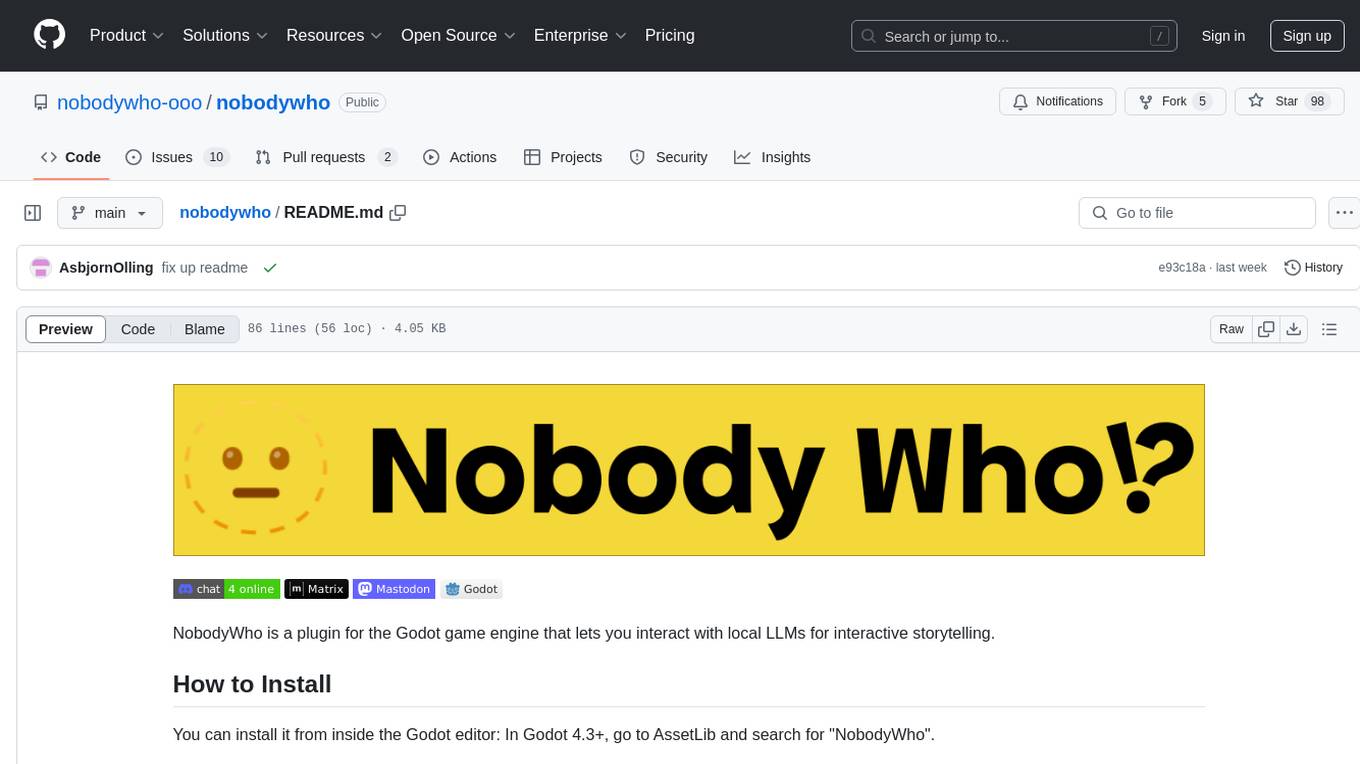
nobodywho
NobodyWho is a plugin for the Godot game engine that enables interaction with local LLMs for interactive storytelling. Users can install it from Godot editor or GitHub releases page, providing their own LLM in GGUF format. The plugin consists of `NobodyWhoModel` node for model file, `NobodyWhoChat` node for chat interaction, and `NobodyWhoEmbedding` node for generating embeddings. It offers a programming interface for sending text to LLM, receiving responses, and starting the LLM worker.
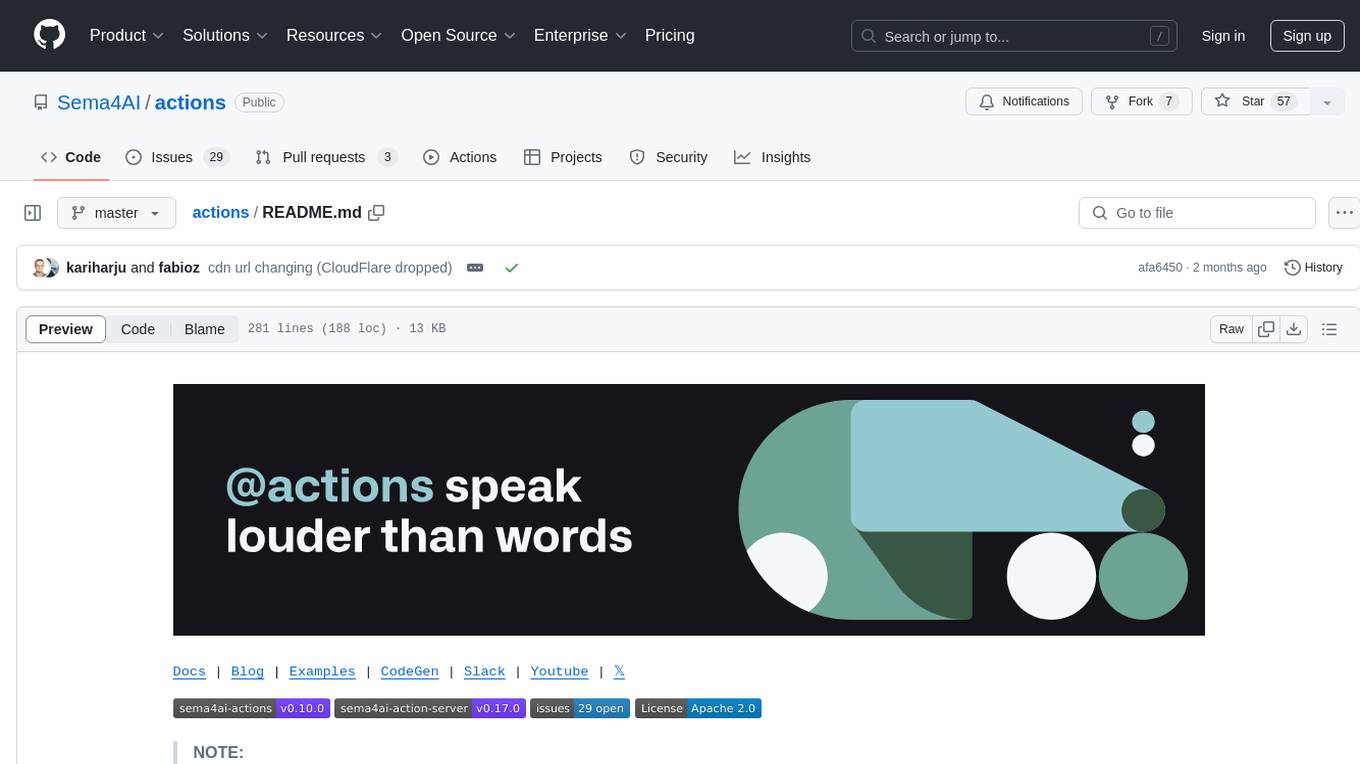
actions
Sema4.ai Action Server is a tool that allows users to build semantic actions in Python to connect AI agents with real-world applications. It enables users to create custom actions, skills, loaders, and plugins that securely connect any AI Assistant platform to data and applications. The tool automatically creates and exposes an API based on function declaration, type hints, and docstrings by adding '@action' to Python scripts. It provides an end-to-end stack supporting various connections between AI and user's apps and data, offering ease of use, security, and scalability.

agentok
Agentok Studio is a visual tool built for AutoGen, a cutting-edge agent framework from Microsoft and various contributors. It offers intuitive visual tools to simplify the construction and management of complex agent-based workflows. Users can create workflows visually as graphs, chat with agents, and share flow templates. The tool is designed to streamline the development process for creators and developers working on next-generation Multi-Agent Applications.
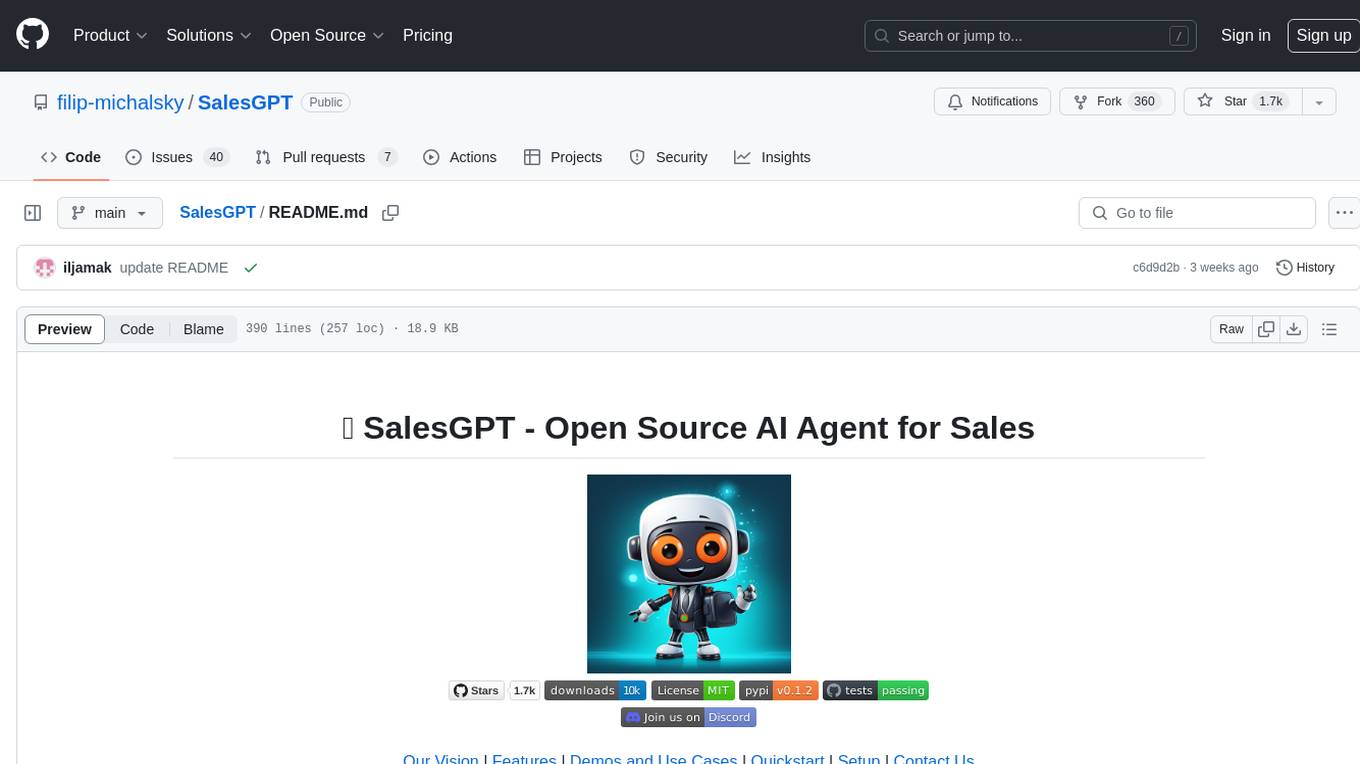
SalesGPT
SalesGPT is an open-source AI agent designed for sales, utilizing context-awareness and LLMs to work across various communication channels like voice, email, and texting. It aims to enhance sales conversations by understanding the stage of the conversation and providing tools like product knowledge base to reduce errors. The agent can autonomously generate payment links, handle objections, and close sales. It also offers features like automated email communication, meeting scheduling, and integration with various LLMs for customization. SalesGPT is optimized for low latency in voice channels and ensures human supervision where necessary. The tool provides enterprise-grade security and supports LangSmith tracing for monitoring and evaluation of intelligent agents built on LLM frameworks.

robocorp
Robocorp is a platform that allows users to create, deploy, and operate Python automations and AI actions. It provides an easy way to extend the capabilities of AI agents, assistants, and copilots with custom actions written in Python. Users can create and deploy tools, skills, loaders, and plugins that securely connect any AI Assistant platform to their data and applications. The Robocorp Action Server makes Python scripts compatible with ChatGPT and LangChain by automatically creating and exposing an API based on function declaration, type hints, and docstrings. It simplifies the process of developing and deploying AI actions, enabling users to interact with AI frameworks effortlessly.
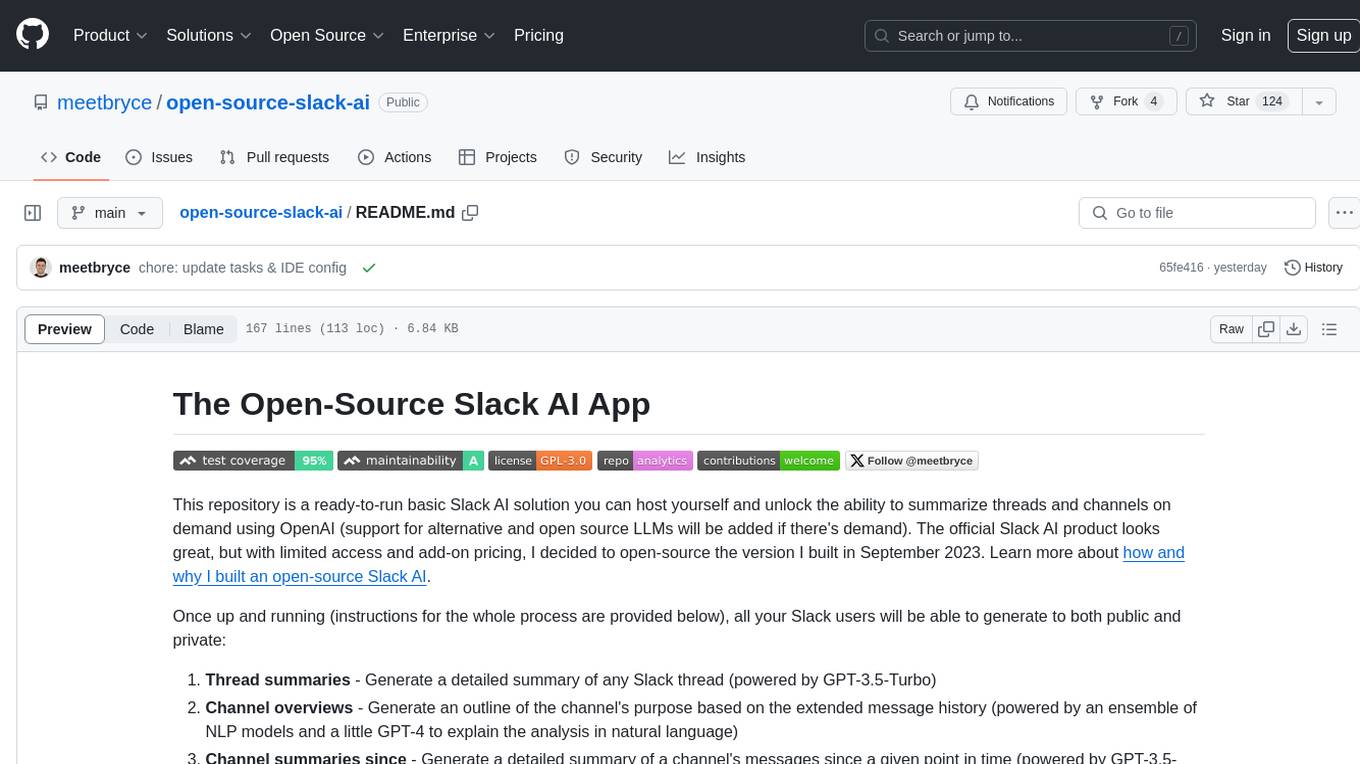
open-source-slack-ai
This repository provides a ready-to-run basic Slack AI solution that allows users to summarize threads and channels using OpenAI. Users can generate thread summaries, channel overviews, channel summaries since a specific time, and full channel summaries. The tool is powered by GPT-3.5-Turbo and an ensemble of NLP models. It requires Python 3.8 or higher, an OpenAI API key, Slack App with associated API tokens, Poetry package manager, and ngrok for local development. Users can customize channel and thread summaries, run tests with coverage using pytest, and contribute to the project for future enhancements.

Perplexica
Perplexica is an open-source AI-powered search engine that utilizes advanced machine learning algorithms to provide clear answers with sources cited. It offers various modes like Copilot Mode, Normal Mode, and Focus Modes for specific types of questions. Perplexica ensures up-to-date information by using SearxNG metasearch engine. It also features image and video search capabilities and upcoming features include finalizing Copilot Mode and adding Discover and History Saving features.
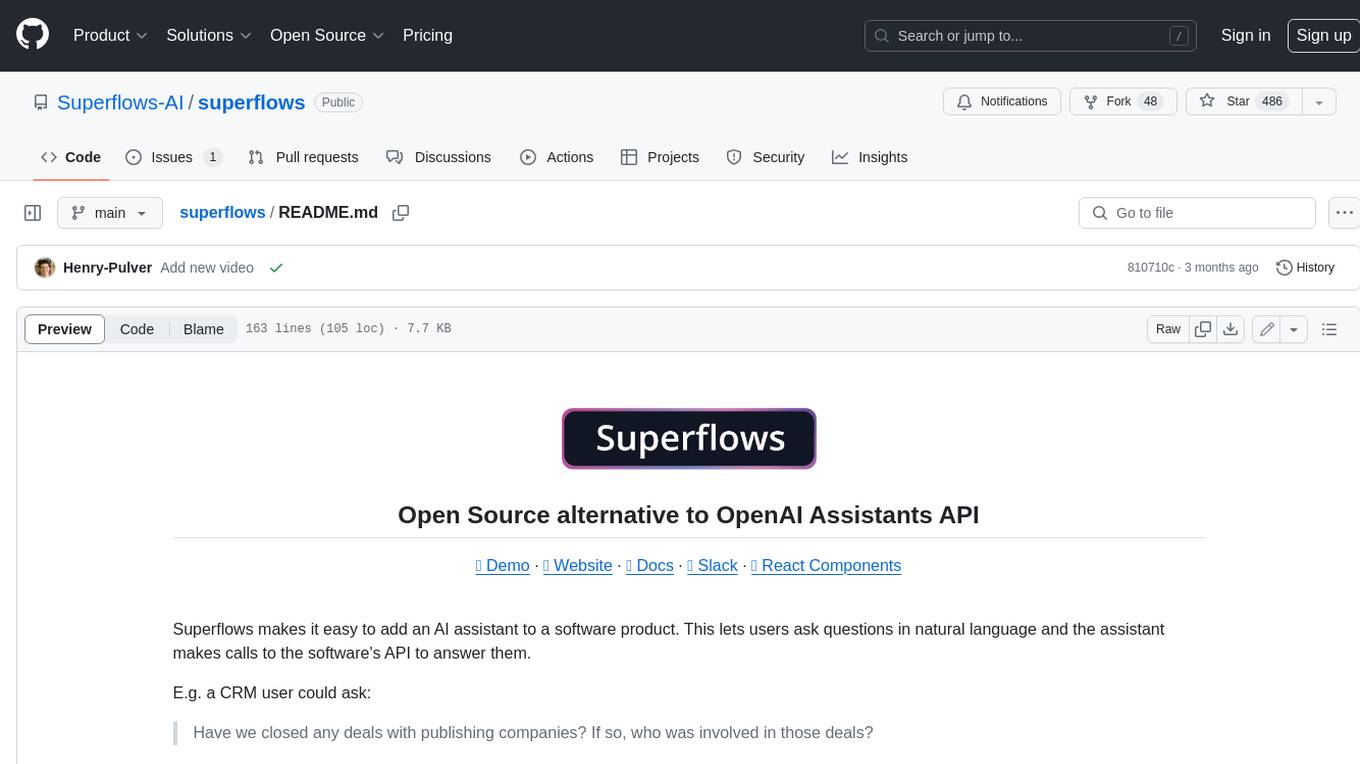
superflows
Superflows is an open-source alternative to OpenAI's Assistant API. It allows developers to easily add an AI assistant to their software products, enabling users to ask questions in natural language and receive answers or have tasks completed by making API calls. Superflows can analyze data, create plots, answer questions based on static knowledge, and even write code. It features a developer dashboard for configuration and testing, stateful streaming API, UI components, and support for multiple LLMs. Superflows can be set up in the cloud or self-hosted, and it provides comprehensive documentation and support.

serverless-chat-langchainjs
This sample shows how to build a serverless chat experience with Retrieval-Augmented Generation using LangChain.js and Azure. The application is hosted on Azure Static Web Apps and Azure Functions, with Azure Cosmos DB for MongoDB vCore as the vector database. You can use it as a starting point for building more complex AI applications.
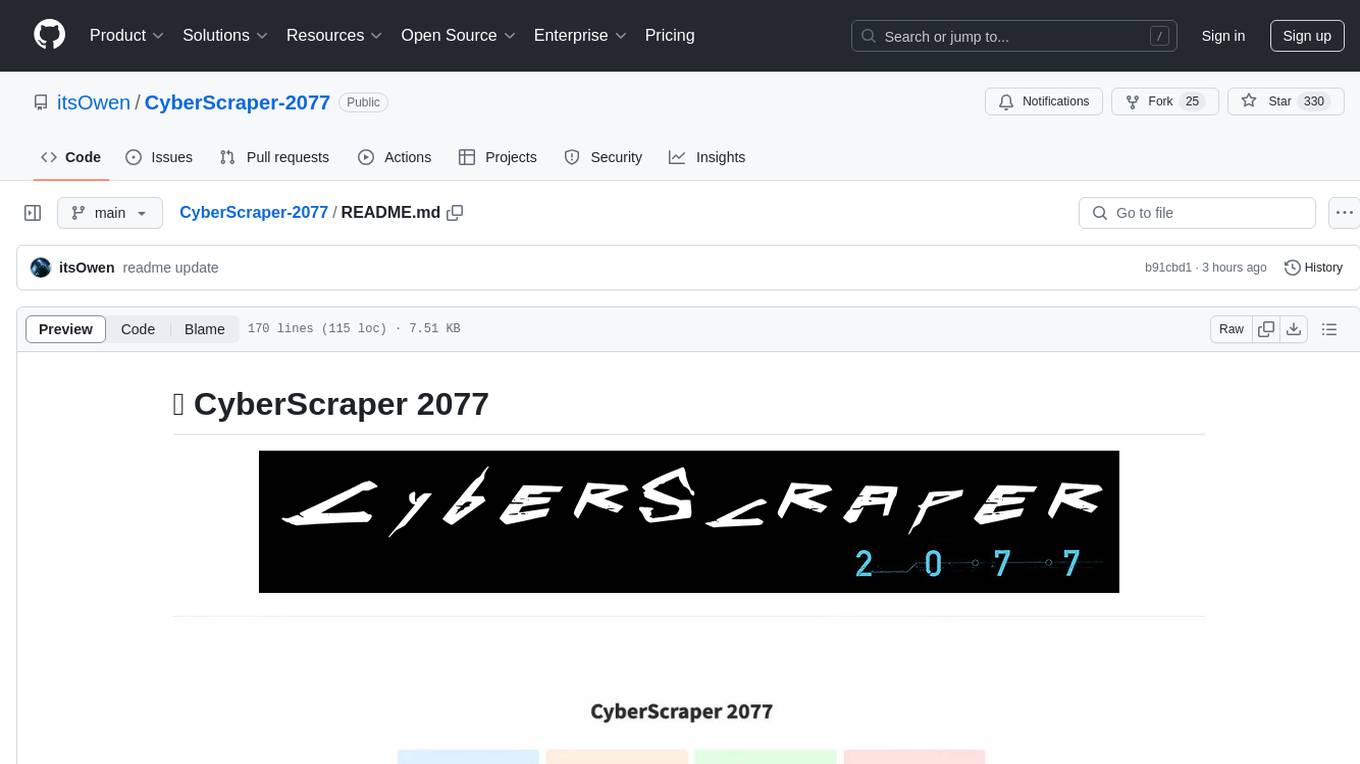
CyberScraper-2077
CyberScraper 2077 is an advanced web scraping tool powered by AI, designed to extract data from websites with precision and style. It offers a user-friendly interface, supports multiple data export formats, operates in stealth mode to avoid detection, and promises lightning-fast scraping. The tool respects ethical scraping practices, including robots.txt and site policies. With upcoming features like proxy support and page navigation, CyberScraper 2077 is a futuristic solution for data extraction in the digital realm.
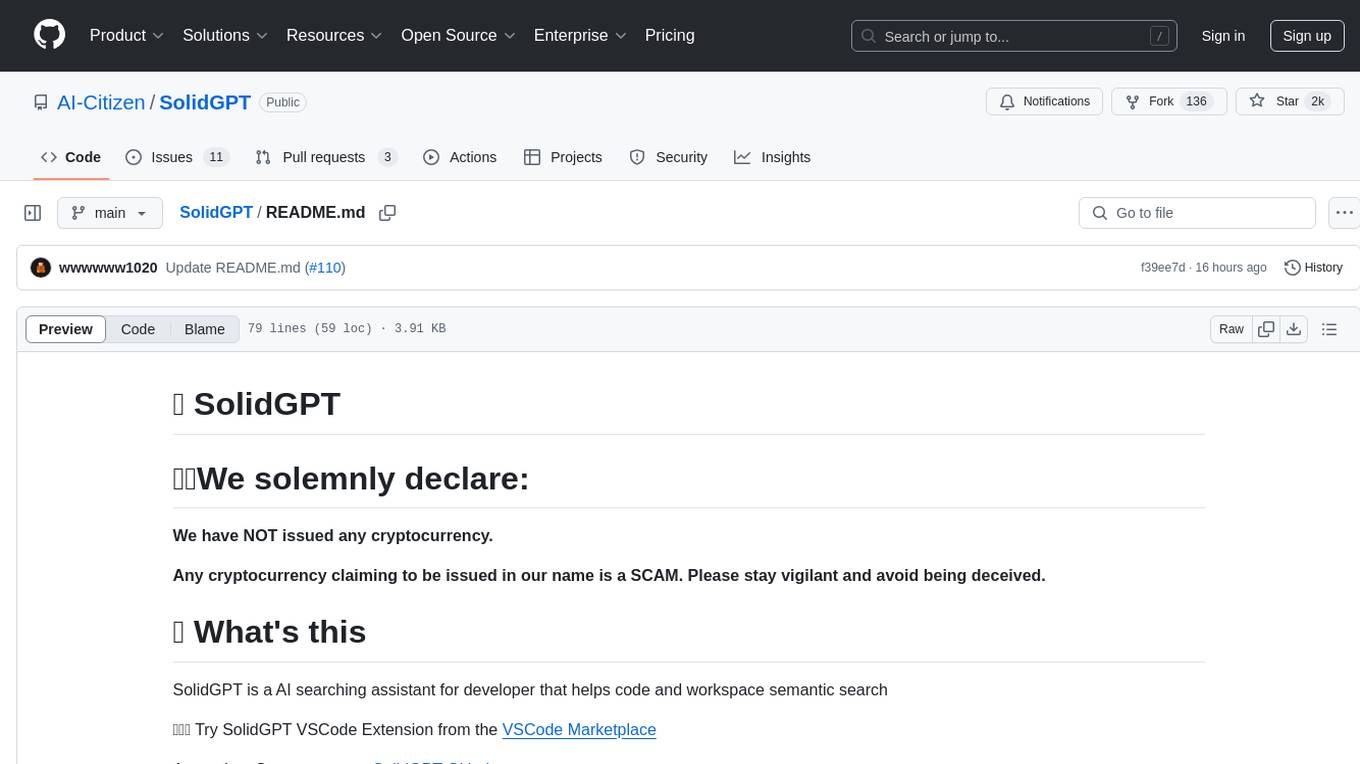
SolidGPT
SolidGPT is an AI searching assistant for developers that helps with code and workspace semantic search. It provides features such as talking to your codebase, asking questions about your codebase, semantic search and summary in Notion, and getting questions answered from your codebase and Notion without context switching. The tool ensures data safety by not collecting users' data and uses the OpenAI series model API.
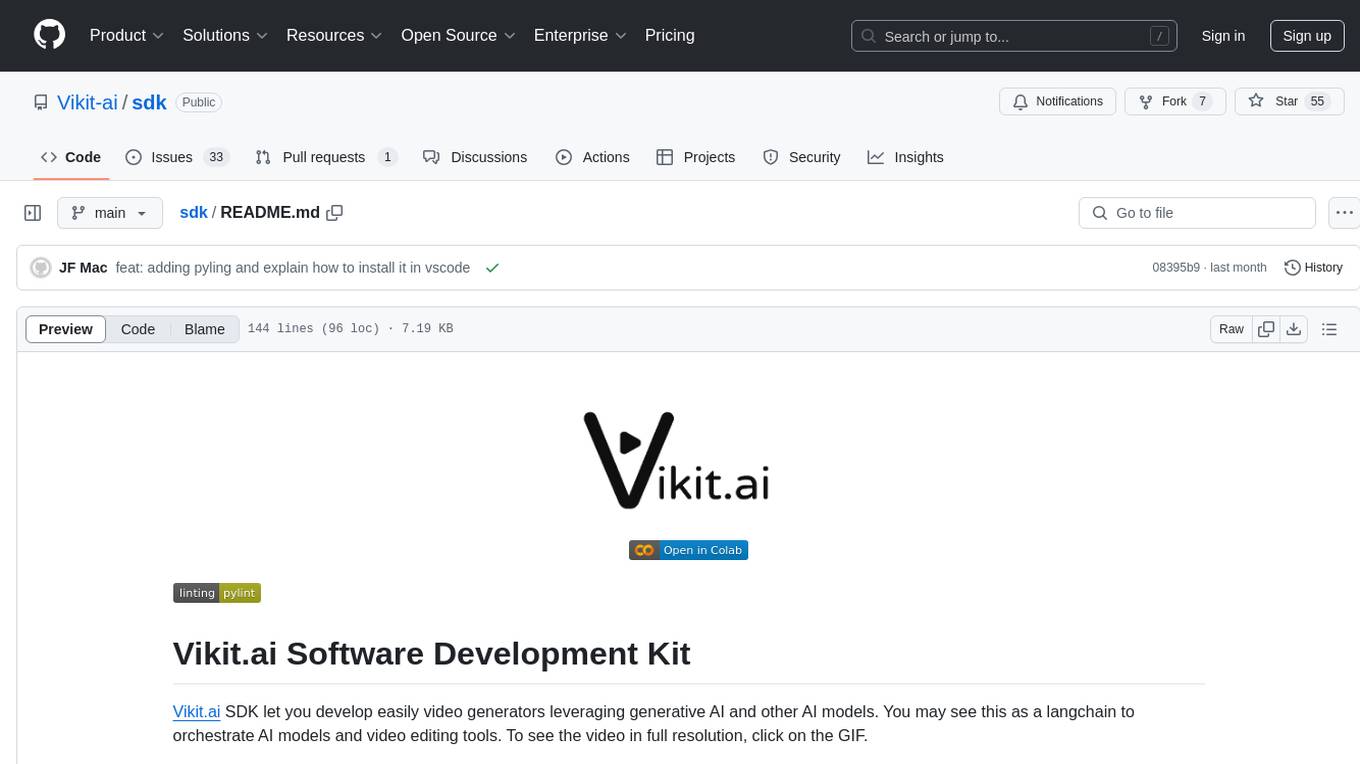
sdk
Vikit.ai SDK is a software development kit that enables easy development of video generators using generative AI and other AI models. It serves as a langchain to orchestrate AI models and video editing tools. The SDK allows users to create videos from text prompts with background music and voice-over narration. It also supports generating composite videos from multiple text prompts. The tool requires Python 3.8+, specific dependencies, and tools like FFMPEG and ImageMagick for certain functionalities. Users can contribute to the project by following the contribution guidelines and standards provided.
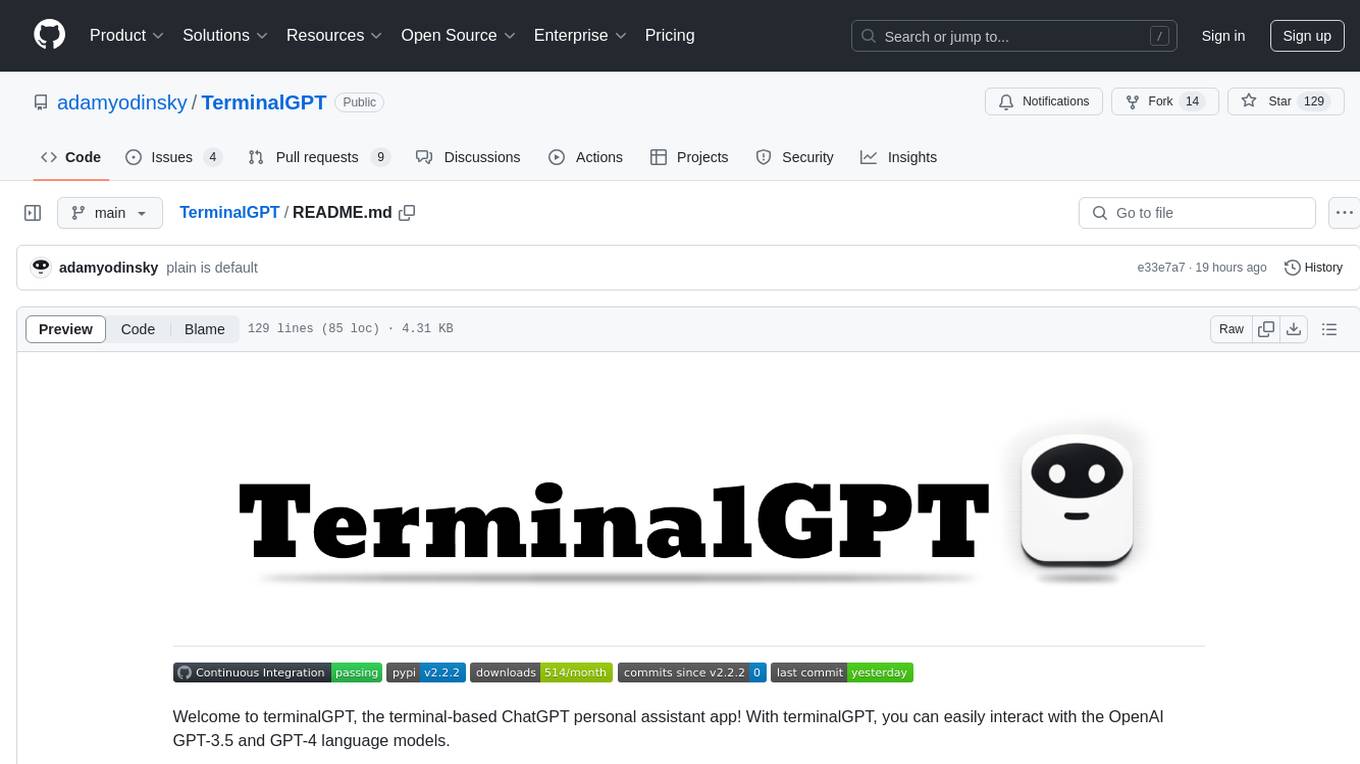
TerminalGPT
TerminalGPT is a terminal-based ChatGPT personal assistant app that allows users to interact with OpenAI GPT-3.5 and GPT-4 language models. It offers advantages over browser-based apps, such as continuous availability, faster replies, and tailored answers. Users can use TerminalGPT in their IDE terminal, ensuring seamless integration with their workflow. The tool prioritizes user privacy by not using conversation data for model training and storing conversations locally on the user's machine.
For similar tasks
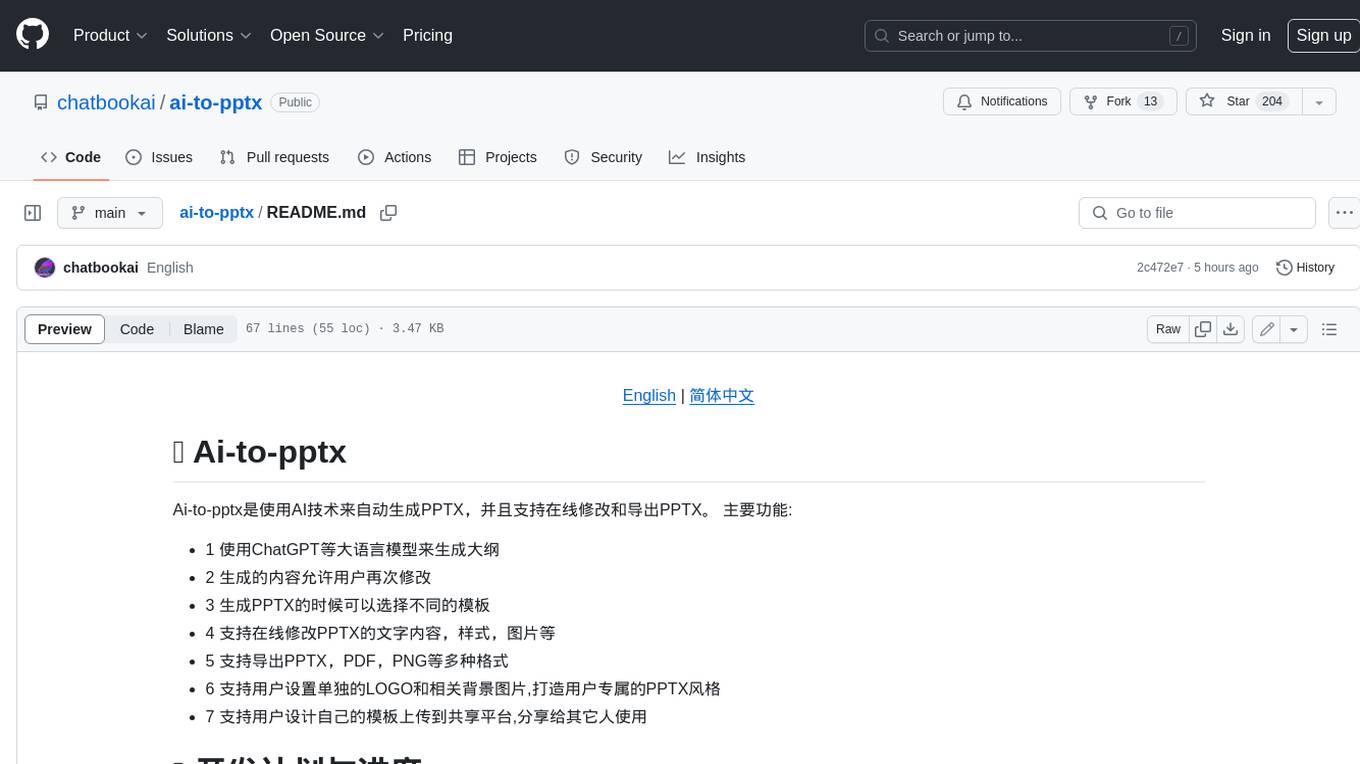
ai-to-pptx
Ai-to-pptx is a tool that uses AI technology to automatically generate PPTX, and supports online editing and exporting of PPTX. Main functions: - 1 Use large language models such as ChatGPT to generate outlines - 2 The generated content allows users to modify again - 3 Different templates can be selected when generating PPTX - 4 Support online editing of PPTX text content, style, pictures, etc. - 5 Supports exporting PPTX, PDF, PNG and other formats - 6 Support users to set their own LOGO and related background pictures to create their own exclusive PPTX style - 7 Support users to design their own templates and upload them to the sharing platform for others to use
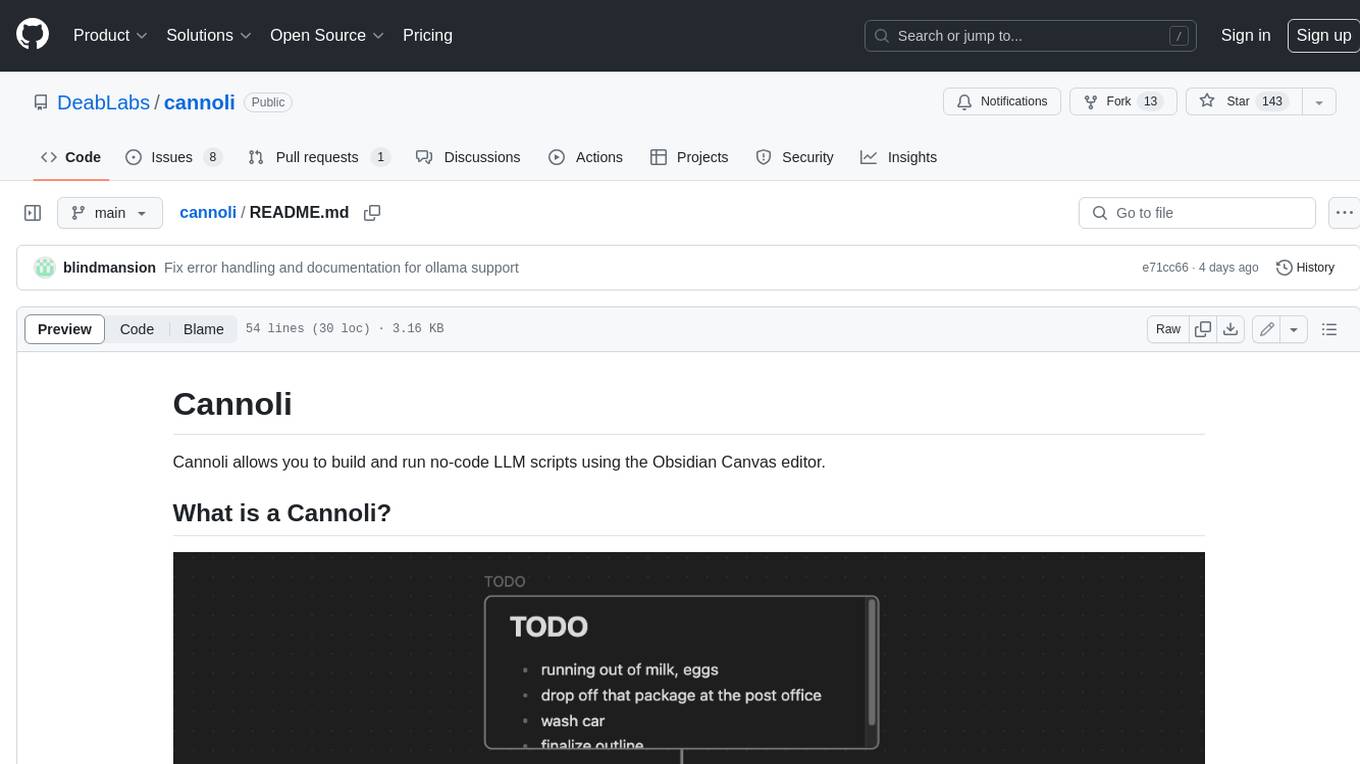
cannoli
Cannoli allows you to build and run no-code LLM scripts using the Obsidian Canvas editor. Cannolis are scripts that leverage the OpenAI API to read/write to your vault, and take actions using HTTP requests. They can be used to automate tasks, create custom llm-chatbots, and more.
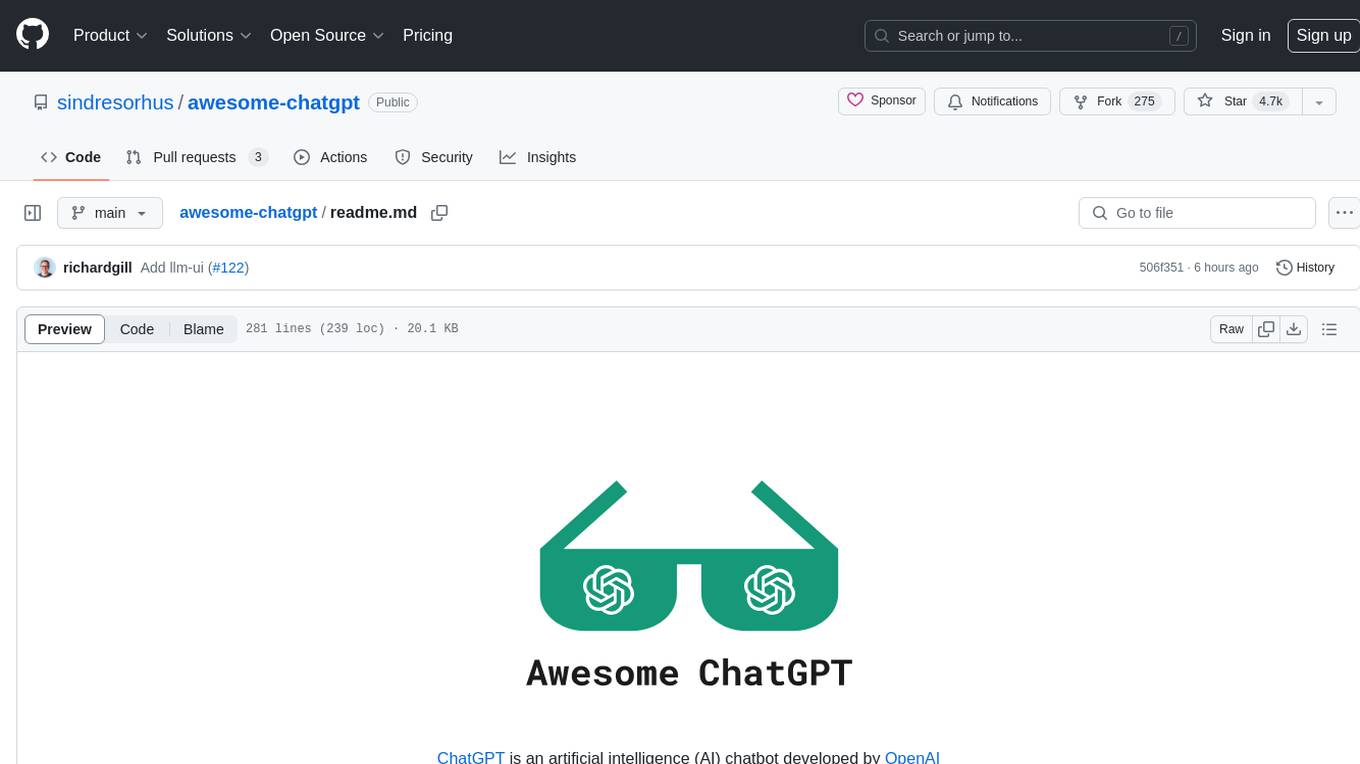
awesome-chatgpt
Awesome ChatGPT is an artificial intelligence chatbot developed by OpenAI. It offers a wide range of applications, web apps, browser extensions, CLI tools, bots, integrations, and packages for various platforms. Users can interact with ChatGPT through different interfaces and use it for tasks like generating text, creating presentations, summarizing content, and more. The ecosystem around ChatGPT includes tools for developers, writers, researchers, and individuals looking to leverage AI technology for different purposes.
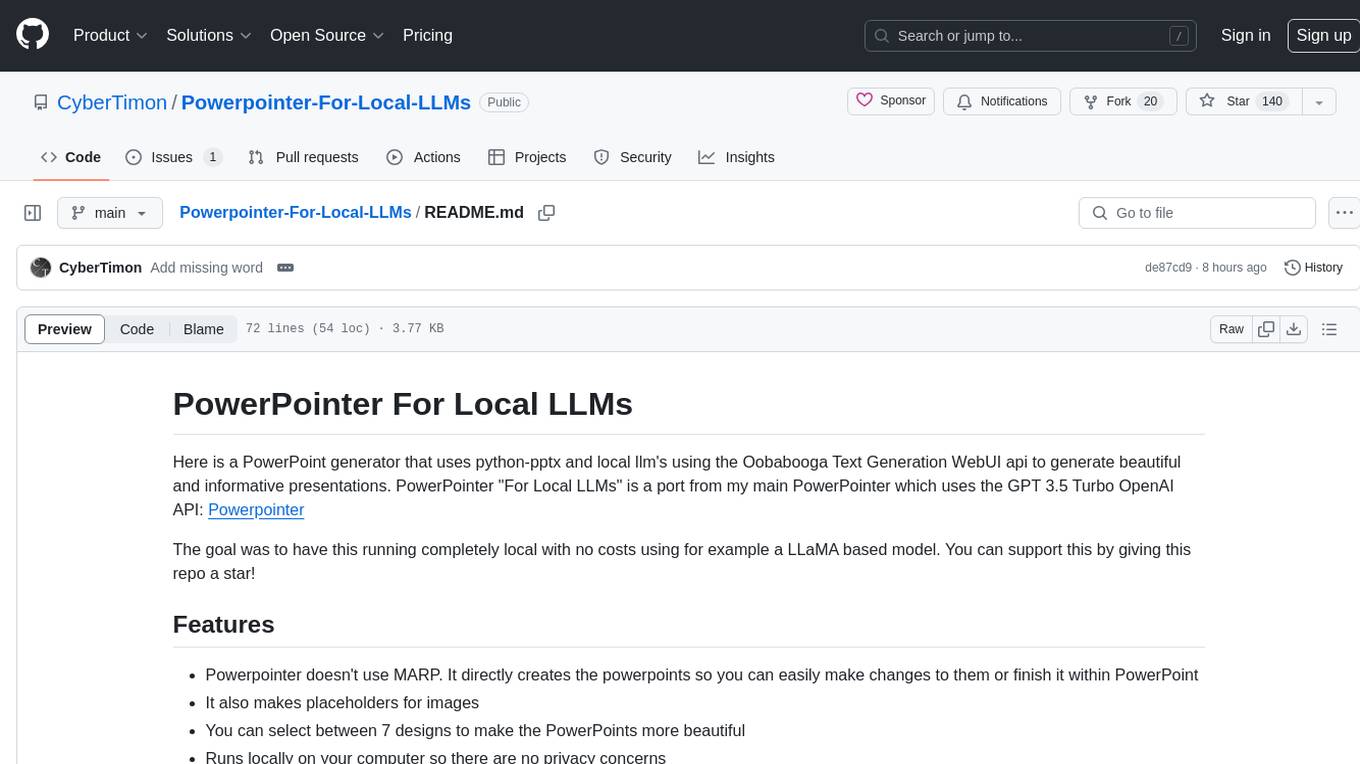
Powerpointer-For-Local-LLMs
PowerPointer For Local LLMs is a PowerPoint generator that uses python-pptx and local llm's via the Oobabooga Text Generation WebUI api to create beautiful and informative presentations. It runs locally on your computer, eliminating privacy concerns. The tool allows users to select from 7 designs, make placeholders for images, and easily customize presentations within PowerPoint. Users provide information for the PowerPoint, which is then used to generate text using optimized prompts and the text generation webui api. The generated text is converted into a PowerPoint presentation using the python-pptx library.
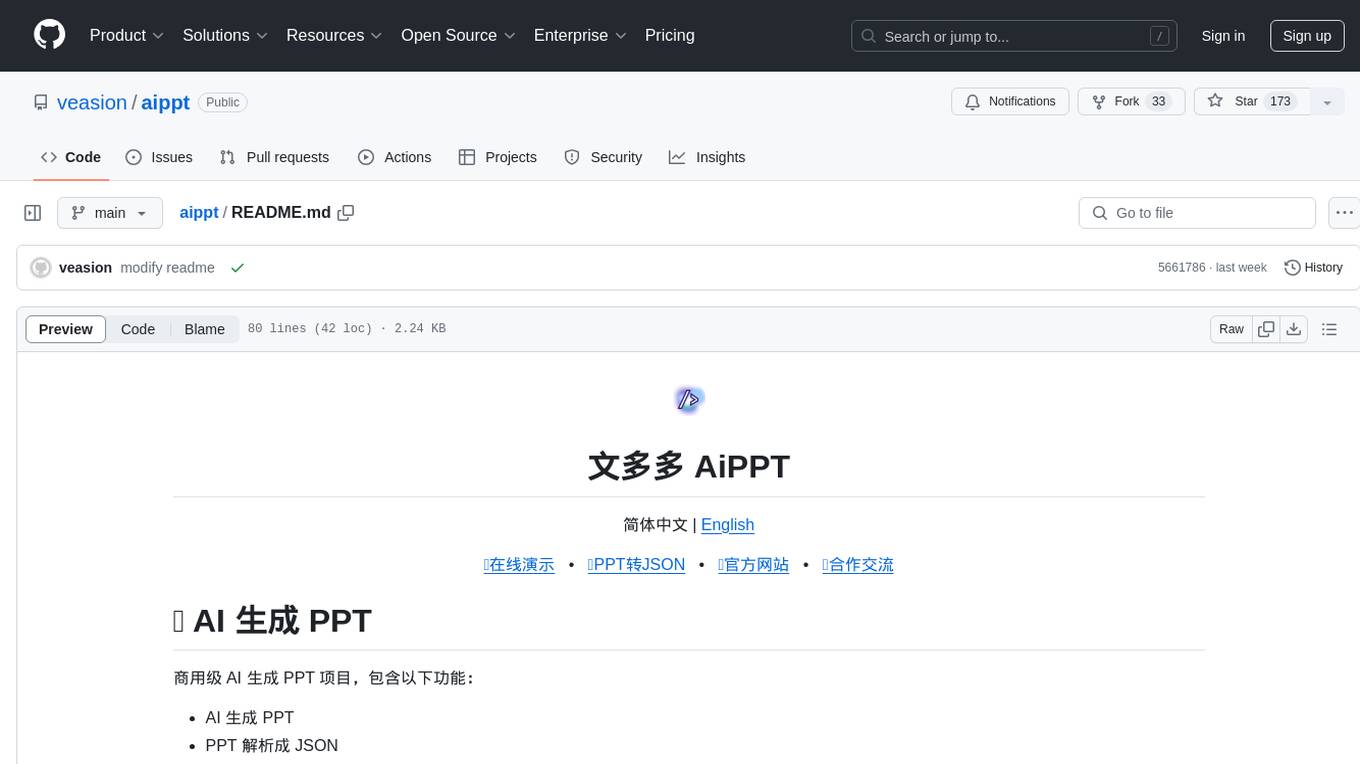
aippt
Aippt is a commercial-grade AI tool for generating, parsing, and rendering PowerPoint presentations. It offers functionalities such as AI-powered PPT generation, PPT to JSON conversion, and JSON to PPT rendering. Users can experience online editing, upload PPT files for rendering, and download edited PPT files. The tool also supports commercial partnerships for custom industry solutions, native chart and animation support, user-defined templates, and competitive pricing. Aippt is available for commercial use with options for agency support and private deployment. The official website offers open APIs and an open platform for API/UI integration.
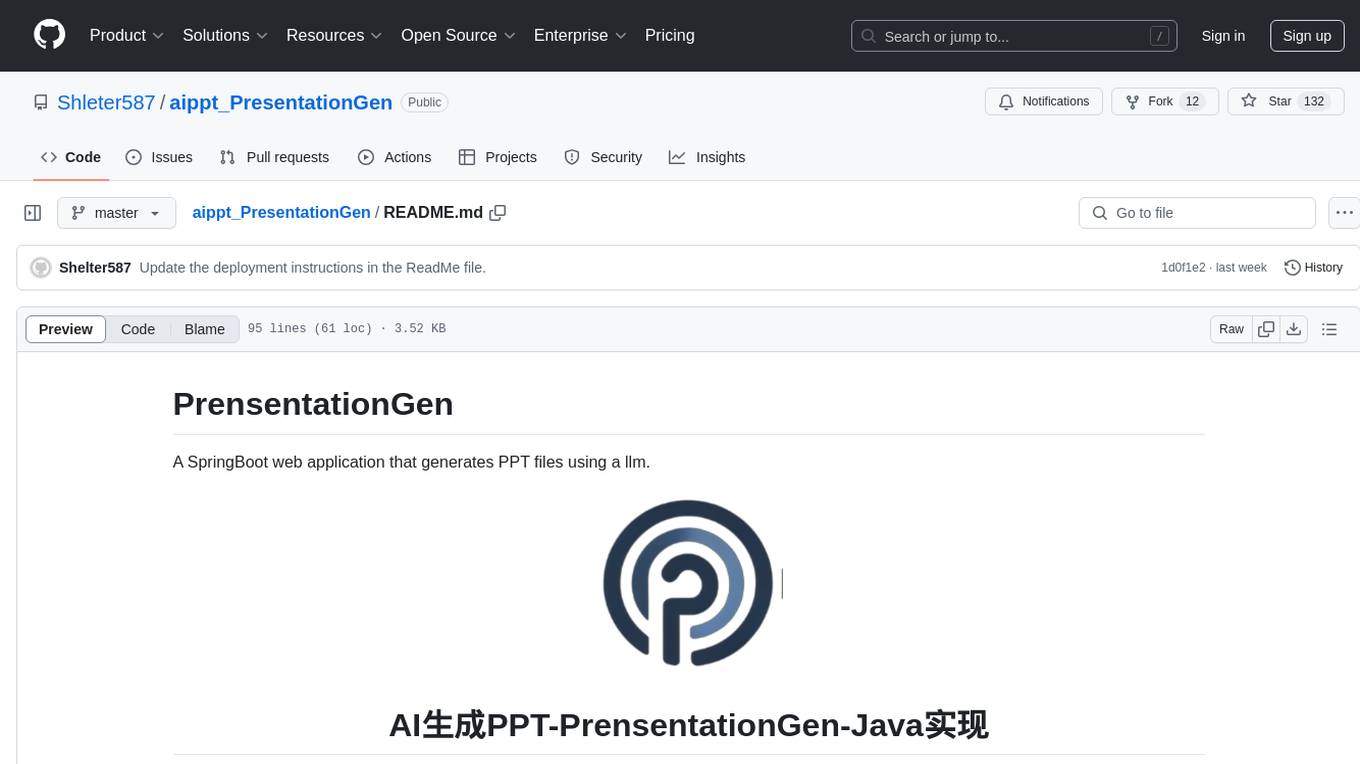
aippt_PresentationGen
A SpringBoot web application that generates PPT files using a llm. The tool preprocesses single-page templates and dynamically combines them to generate PPTX files with text replacement functionality. It utilizes technologies such as SpringBoot, MyBatis, MySQL, Redis, WebFlux, Apache POI, Aspose Slides, OSS, and Vue2. Users can deploy the tool by configuring various parameters in the application.yml file and setting up necessary resources like MySQL, OSS, and API keys. The tool also supports integration with open-source image libraries like Unsplash for adding images to the presentations.
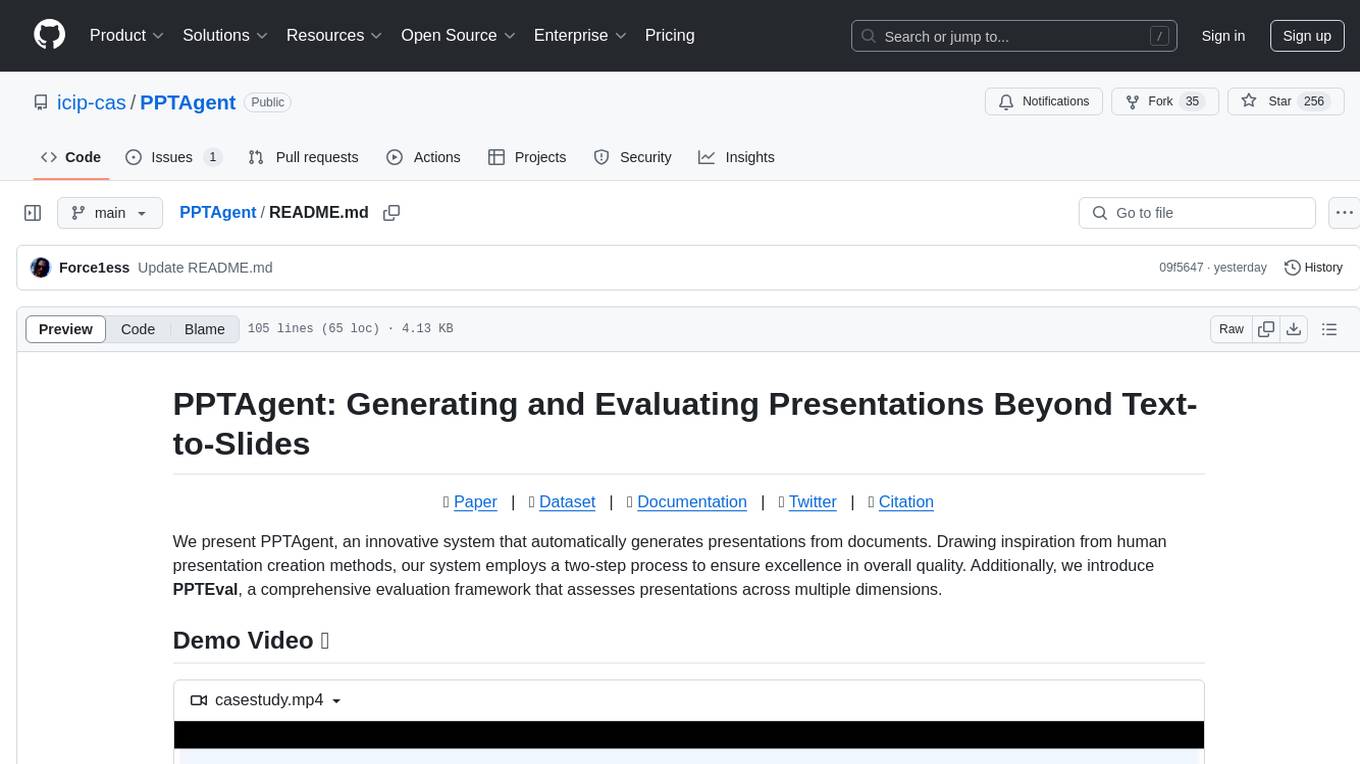
PPTAgent
PPTAgent is an innovative system that automatically generates presentations from documents. It employs a two-step process for quality assurance and introduces PPTEval for comprehensive evaluation. With dynamic content generation, smart reference learning, and quality assessment, PPTAgent aims to streamline presentation creation. The tool follows an analysis phase to learn from reference presentations and a generation phase to develop structured outlines and cohesive slides. PPTEval evaluates presentations based on content accuracy, visual appeal, and logical coherence.

Sentient
Sentient is a personal, private, and interactive AI companion developed by Existence. The project aims to build a completely private AI companion that is deeply personalized and context-aware of the user. It utilizes automation and privacy to create a true companion for humans. The tool is designed to remember information about the user and use it to respond to queries and perform various actions. Sentient features a local and private environment, MBTI personality test, integrations with LinkedIn, Reddit, and more, self-managed graph memory, web search capabilities, multi-chat functionality, and auto-updates for the app. The project is built using technologies like ElectronJS, Next.js, TailwindCSS, FastAPI, Neo4j, and various APIs.
For similar jobs

sweep
Sweep is an AI junior developer that turns bugs and feature requests into code changes. It automatically handles developer experience improvements like adding type hints and improving test coverage.

teams-ai
The Teams AI Library is a software development kit (SDK) that helps developers create bots that can interact with Teams and Microsoft 365 applications. It is built on top of the Bot Framework SDK and simplifies the process of developing bots that interact with Teams' artificial intelligence capabilities. The SDK is available for JavaScript/TypeScript, .NET, and Python.

ai-guide
This guide is dedicated to Large Language Models (LLMs) that you can run on your home computer. It assumes your PC is a lower-end, non-gaming setup.

classifai
Supercharge WordPress Content Workflows and Engagement with Artificial Intelligence. Tap into leading cloud-based services like OpenAI, Microsoft Azure AI, Google Gemini and IBM Watson to augment your WordPress-powered websites. Publish content faster while improving SEO performance and increasing audience engagement. ClassifAI integrates Artificial Intelligence and Machine Learning technologies to lighten your workload and eliminate tedious tasks, giving you more time to create original content that matters.

chatbot-ui
Chatbot UI is an open-source AI chat app that allows users to create and deploy their own AI chatbots. It is easy to use and can be customized to fit any need. Chatbot UI is perfect for businesses, developers, and anyone who wants to create a chatbot.

BricksLLM
BricksLLM is a cloud native AI gateway written in Go. Currently, it provides native support for OpenAI, Anthropic, Azure OpenAI and vLLM. BricksLLM aims to provide enterprise level infrastructure that can power any LLM production use cases. Here are some use cases for BricksLLM: * Set LLM usage limits for users on different pricing tiers * Track LLM usage on a per user and per organization basis * Block or redact requests containing PIIs * Improve LLM reliability with failovers, retries and caching * Distribute API keys with rate limits and cost limits for internal development/production use cases * Distribute API keys with rate limits and cost limits for students

uAgents
uAgents is a Python library developed by Fetch.ai that allows for the creation of autonomous AI agents. These agents can perform various tasks on a schedule or take action on various events. uAgents are easy to create and manage, and they are connected to a fast-growing network of other uAgents. They are also secure, with cryptographically secured messages and wallets.

griptape
Griptape is a modular Python framework for building AI-powered applications that securely connect to your enterprise data and APIs. It offers developers the ability to maintain control and flexibility at every step. Griptape's core components include Structures (Agents, Pipelines, and Workflows), Tasks, Tools, Memory (Conversation Memory, Task Memory, and Meta Memory), Drivers (Prompt and Embedding Drivers, Vector Store Drivers, Image Generation Drivers, Image Query Drivers, SQL Drivers, Web Scraper Drivers, and Conversation Memory Drivers), Engines (Query Engines, Extraction Engines, Summary Engines, Image Generation Engines, and Image Query Engines), and additional components (Rulesets, Loaders, Artifacts, Chunkers, and Tokenizers). Griptape enables developers to create AI-powered applications with ease and efficiency.








